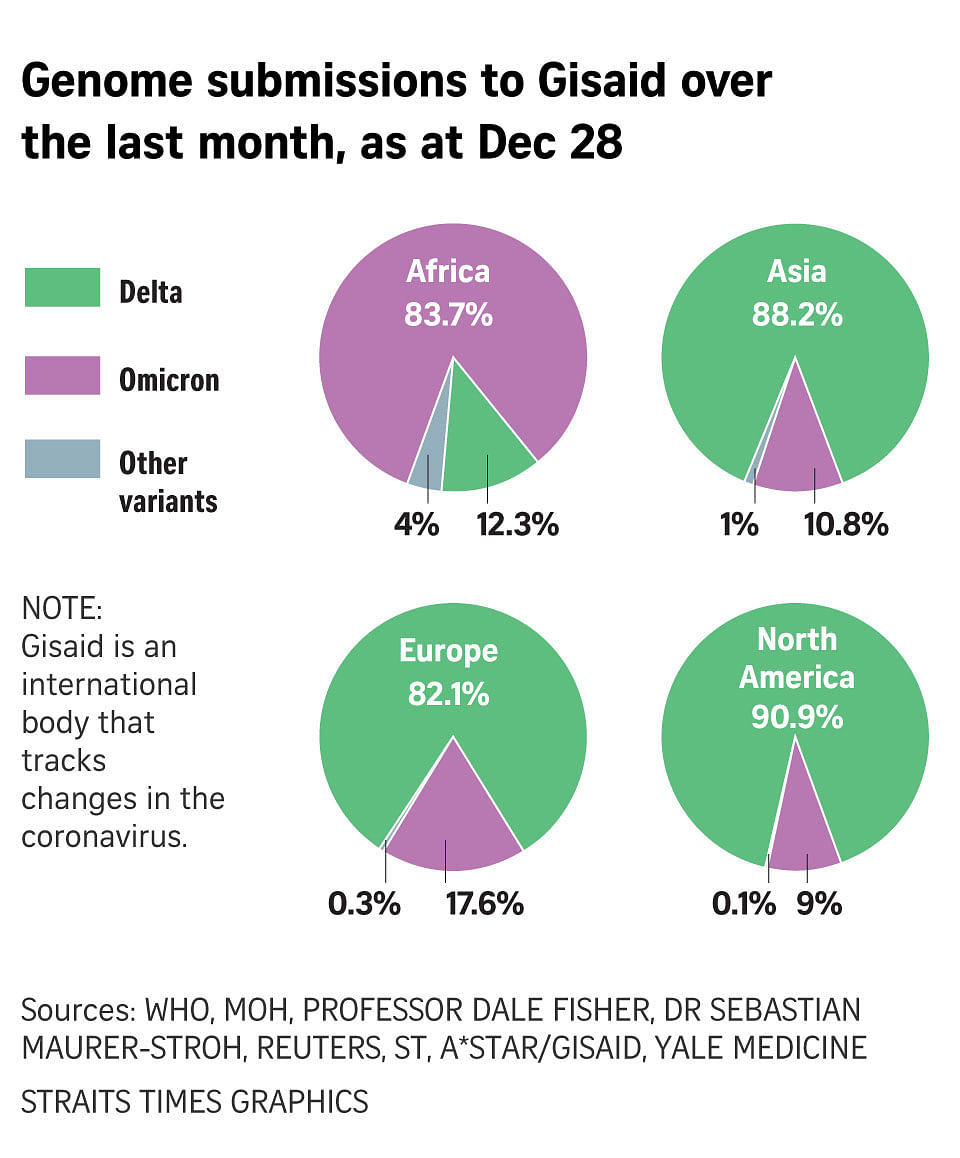Experts believe Omicron will soon displace Delta as the dominant global strain
Sign up now: Get ST's newsletters delivered to your inbox

Evidence indicates that the Omicron variant is likely to be more transmissible, but less severe than Delta.
PHOTO: REUTERS
SINGAPORE - The new and more contagious Omicron variant is expected to replace Delta – the current globally dominant Covid-19 strain – in weeks or months, say experts.
While Delta is still the most common variant in all continents except Africa, Omicron is rising very quickly, said Dr Sebastian Maurer-Stroh, executive director of the Agency for Science, Technology and Research’s Bioinformatics Institute.
Of the genetic sequences of virus samples sent to Gisaid – a data science initiative that provides the shared genome platform for Covid-19 – the Omicron strain has accounted for between 7 per cent and 27 per cent of new submissions over the past month, up until Tuesday. The figures refer to all continents except Africa.
Those genetic sequences are usually sent in by government institutions, universities and other laboratories.
Dr Maurer-Stroh is part of the global team that maintains Gisaid.
The new variant was first detected in South Africa in November, before it rippled across more than 110 countries, as at last weekend.
Professor Dale Fisher, a senior consultant at the National University Hospital’s Division of Infectious Diseases, noted that Omicron is already dominant in Australia, India, Russia, South Africa and the United Kingdom.
In those nations, Omicron comprised between 59 and 95 per cent of recent Sars-CoV-2 genetic sequences, as at Monday, according to the Our World in Data website, a scientific database.

While the Delta variant has 13 mutations with nine on the spike protein, Omicron has about 50 mutations, and 32 of them are on the spike protein. The spike protein allows the virus to bind to human cells.
Because of its mutations, the Delta variant attaches more effectively to human cell receptors, causing it to be more infective, said Prof Fisher.
Those receptors, called the ACE2 receptors, are the virus’s gateway into the cell.
The Omicron variant made health authorities more concerned as its extra mutations make it even “stickier”.
The Omicron variant made health authorities more concerned as its extra mutations make it even “stickier”.
In its weekly Covid-19 update on Tuesday, the World Health Organisation said consistent data shows Omicron has a “growth advantage” over Delta, with a doubling time of two to three days. The doubling time refers to the amount of time it takes for infection numbers to double.
Prof Fisher noted: “We are seeing a global transition from Delta to Omicron because with a greater transmissibility, the virus is fitter and has a reproductive advantage.”
The rise and fall of new variants over time follows the laws of nature and the survival of the fittest, he said.
All living things, including viruses, evolve and those changes that improve a species’ survival or its ability to reproduce will see it grow stronger over generations.
The Sars-CoV-2 virus needs to enter human cells to reproduce, Prof Fisher explained.
“The variant that is best at entering the cell will be better at reproducing, and then spreading to other people,” he said.
“Because of Omicron’s mutations in the spike protein, it is obviously better at entering the host because we see the numbers in many countries increasing steeply.”
Prof Fisher said most experts in the field believe Omicron will replace Delta as the dominant strain.
A South Africa study suggested that Delta may be displaced because those who were infected with Omicron, especially those who had been vaccinated, developed enhanced immunity to the Delta variant, Reuters reported on Tuesday.
Dr Maurer-Stroh said the environment in which two variants compete will also help determine which is more successful.
“As immunity in the population increases from both vaccination and natural infection, severity goes down.”
In the race between Delta and Omicron, even a slightly better escape from a population’s immunity can give one variant the extra edge, he said.
This means that the extra mutations and changes in a variant could contribute to evading the prevalent immune response in a population.
On what will happen to the Delta variant over time, Prof Fisher said: “Time will tell whether omicron replaces all variants or there is a coexistence. Certainly in flu, different types can circulate at the same time.”
International evidence indicates the Omicron variant is likely to be less severe than the Delta variant.
As at Wednesday, there were at least 1,055 Omicron cases confirmed in Singapore. The Ministry of Health said on Dec 26 that none had required intensive care or oxygen supplementation.
The UK Health Security Agency said last week that people infected with Omicron were 50 per cent to 70 per cent less likely than those infected with Delta to be hospitalised.
As Omicron and Delta continue to wrestle for dominance, some have wondered whether it would be possible to be infected with both strains at the same time.
This is possible but rare, said Dr Maurer-Stroh.
“And very quickly, only one variant would be the dominant infection in the body.”



